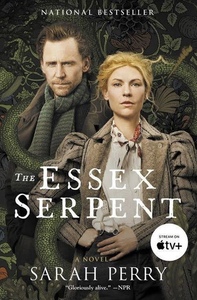Take a photo of a barcode or cover
In the 1890s, newly widowed Cora Seaborne leaves London for a village in Essex. She is now free; free to explore nature, to spend time with friends, old and new, and to be caught up in superstition and legend about the Essex Serpent. Slow to get going, it's a book about intellect, the blurring of friendship and romantic love, faith and reason. There is a very strong sense of place, and such vivid characters.
adventurous
mysterious
medium-paced
Plot or Character Driven:
Character
Loveable characters:
Complicated
i love to read books written for women over 30... crazy crazy web of relationships in this one overall represented with complexity and honesty but ending wasn't very emotionally fulfilling (for me at least) and pacing of the ending and entire book was a tad peculiar
I think this book is probably worth more than three stars, but I (unfortunately) started reading it when I really didn’t have the brain power for it. This book does require a certain level of focus (the perspectives switch so often and without much obvious notice, for example), and it wasn’t a story particularly conducive for me while moving cross country and starting a new job. I’ll hang onto it and check it out again when I’ve got a bit more focus in me. I think there’s some genius hidden here, but I wasn’t right for the book this time, I’m afraid. I blame me, not the text. (At least for now.)
A good friend of mine mentioned offhand that she adored this book; so, naturally, I decided to give it a go. While the cover promises an eerie mystery involving a sea serpent, I was actually more invested in the relationships between the characters, and was quite content to have the mystery looming in the background, just beneath the surface of the narrative. While I wouldn’t recommend this book for lovers of supernatural thrillers, I would recommend it to anyone with a taste for literary fiction and natural history; this novel was an absolute delight and kept me reading, wanting to feel surrounded by the Essex that Perry portrays.
Things I Liked
1. Prose: Perry’s prose is very literary, but also very deft at creating an atmosphere. I loved the way she described Essex and the way characters moved through space. Perry is also good at writing her characters’ interiority in a way that feels at once poetic and restrained, never quite verging on the edge of melodrama, but conveying an intensity nonetheless.
2. Characters: Every character in this book was developed and grabbed my attention. Cora is desperate to draw people around her, yet values the freedom she finds in roaming the Essex countryside. Martha, her companion, is a Socialist and finds herself drawn to Cora, despite being frequently impatient with her. Will is a man of faith but open to the curiosities of science. And so on. I love that this book doesn’t shy away from any of their flaws, too - a character can do something that I think is wrong, and yet I’m still invested in their story because they feel like fully-realized people.
3. Relationships Between Characters: I very much enjoyed the relationships that Perry builds between characters. They have their ups and downs, as any relationship would, keeping me reading so I could see how the characters would continue to interact. I especially liked the complexity of Will’s and Cora’s relationship, with Will embodying faith and Cora embodying science and reason; they had discussions trying to reconcile the two, and frequently made each other angry, yet the value of their friendship never diminished.
4. Social Politics: This book is feminist in a small way: it portrays Cora as defying the limitations of her gender, intent on studying natural history despite societal expectations. Martha is also very much respected for her social consciousness regarding the poor. Stella enjoys gossip but is so warm-hearted that at no point did it feel like the book ascribed sexist tropes to her.
Things I Didn’t Like
1. Exposition: It admittedly took me a little while to get into this book. The beginning is necessary for setting up the characters and their situations, but I felt like I didn’t get really invested until Cora went to Essex and met the Ransomes.
Recommendations: I would recommend this book if you’re interested in natural history, scientific discovery, medical sciences, archaeology, science vs. faith, and unlikely friendships.
Things I Liked
1. Prose: Perry’s prose is very literary, but also very deft at creating an atmosphere. I loved the way she described Essex and the way characters moved through space. Perry is also good at writing her characters’ interiority in a way that feels at once poetic and restrained, never quite verging on the edge of melodrama, but conveying an intensity nonetheless.
2. Characters: Every character in this book was developed and grabbed my attention. Cora is desperate to draw people around her, yet values the freedom she finds in roaming the Essex countryside. Martha, her companion, is a Socialist and finds herself drawn to Cora, despite being frequently impatient with her. Will is a man of faith but open to the curiosities of science. And so on. I love that this book doesn’t shy away from any of their flaws, too - a character can do something that I think is wrong, and yet I’m still invested in their story because they feel like fully-realized people.
3. Relationships Between Characters: I very much enjoyed the relationships that Perry builds between characters. They have their ups and downs, as any relationship would, keeping me reading so I could see how the characters would continue to interact. I especially liked the complexity of Will’s and Cora’s relationship, with Will embodying faith and Cora embodying science and reason; they had discussions trying to reconcile the two, and frequently made each other angry, yet the value of their friendship never diminished.
4. Social Politics: This book is feminist in a small way: it portrays Cora as defying the limitations of her gender, intent on studying natural history despite societal expectations. Martha is also very much respected for her social consciousness regarding the poor. Stella enjoys gossip but is so warm-hearted that at no point did it feel like the book ascribed sexist tropes to her.
Things I Didn’t Like
1. Exposition: It admittedly took me a little while to get into this book. The beginning is necessary for setting up the characters and their situations, but I felt like I didn’t get really invested until Cora went to Essex and met the Ransomes.
Recommendations: I would recommend this book if you’re interested in natural history, scientific discovery, medical sciences, archaeology, science vs. faith, and unlikely friendships.
A beautifully written, engrossing book. I do want to say, though, that in a book about friendship the love triangles/quadrangles are tiresome.
adventurous
dark
emotional
mysterious
reflective
fast-paced
Plot or Character Driven:
A mix
Strong character development:
Yes
Loveable characters:
Complicated
Diverse cast of characters:
Yes
Flaws of characters a main focus:
Yes
I don't think I would have ever finished this book had I not happened to have it at home when the quarantine started. Its interesting in that it takes place within a year, the dates clearly marked, delineating a town having difficulty coping with a spectre, that they decided was the Essex Serpent. In that, its fairly similar to my actual life (something I'm sure the author never anticipated or intended) but made it better than otherwise. Its obviously "literature" in the sense of big themes, and lot of descriptions of the weather. I don't think I cared about Cora? Or Will? And Martha was vaguely a sketch of a person. But Luke and Spencer were lovely fascinating characters who I wish had been investigated more, Joanna was an interesting child, and weirdly the Ambroses felt more fleshed out as people. It's not precisely a good book, or one that I would care to read again. More that the unease created during the summer so reflects life right now that I felt seen in a way that most other literature is not capable of right now. Its the first book in a couple that I don't regret wasting my time with, but not a favorite.
Closer to probably 7 or 7.5/10
This book is all vibes and atmosphere , not much plot or dialogue.
Really interesting piece of historical fiction that puts you right in Essex. I don’t think I’m that interested in watching the show as not much actually happens in the book?
But surprisingly I still did like this! The characters are interesting to read, and a lot of good female leads which I enjoyed.
The diseases and medical portions were cool to read, as well as the letters written by the characters. Overall I would recommend!
This book is all vibes and atmosphere , not much plot or dialogue.
Really interesting piece of historical fiction that puts you right in Essex. I don’t think I’m that interested in watching the show as not much actually happens in the book?
But surprisingly I still did like this! The characters are interesting to read, and a lot of good female leads which I enjoyed.
The diseases and medical portions were cool to read, as well as the letters written by the characters. Overall I would recommend!
After getting halfway through the book and still not enjoying it, I decided to DNF it. I believe that I gave it a fair chance.
I was drawn quickly into this story and its too many threads. Early naturalists, sea serpents, consumption, surgical history, fair housing-- so much. The overarching theme, that our view of Victorian times is wrong in thinking it a time of prudery, is sometimes lost in the author's ambition to cover everything. I did become attached to the characters, though, and their unrequited (omg so much unrequitedness) love.
I often felt at a distance but was unexpectedly moved by the ending. Sadness not so much as overcome, but accepted as a constant friend.
I often felt at a distance but was unexpectedly moved by the ending. Sadness not so much as overcome, but accepted as a constant friend.





